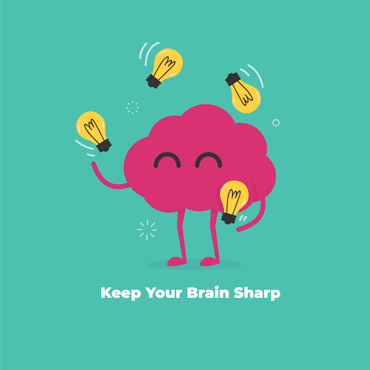 How often do you think about your brain health?
How often do you think about your brain health?
Unless you have memory issues or other brain injuries, it’s probably not too high on your list of health concerns.
June is Alzheimer's and Brain Awareness Month, an opportunity to learn more about the importance of brain health and how to prevent dementia naturally.
An estimated 5.8 million Americans have Alzheimer’s, a type of dementia that causes issues with memory, thinking, and behavior. Symptoms usually start out slowly, but progressively get worse.
Luckily, there are ways to protect your brain.
Studies have shown that certain food choices, regular activity, and memory exercises can help protect people from developing Alzheimer's.
This post will focus on overall brain health, including what foods to eat and memory-stimulating activities to keep the brain sharp for years to come.
Keep Your Brain Healthy
According to the Alzheimer's Research and Prevention Foundation, you can keep your brain healthy by committing to doing certain activities like physical exercise, brain aerobics, and more. Mental exercises in particular can reduce your chance of developing Alzheimer's by up to 70%.
Prevention measures you can take include:
- Alzheimer’s prevention diet
- Exercise
- Stress management
- Being social
- Spiritual fitness
- Mental stimulation
- Quality sleep
While these are all great activities and prevention measures to take for overall good health, chat with your doctor about any serious memory concerns. You may need further neurological testing to clear up if it’s Alzheimer’s or another underlying illness.
There are risk factors that you can’t control, but the following things you can:
Exercise
Regular exercise strengthens the body in so many ways, including mentally and physically. Aside from decreasing health issues like obesity and diabetes, working out protects the brain and thinking skills, according to a University of British Columbia study. Rigorous exercise appears to enlarge the hippocampus, the part of your brain responsible for learning and verbal memory.
Get moving to:
- Improve circulation
- Increase memory
- Boost overall health
- Prevent and slow brain health deterioration
Aim for 150 minutes moderate exercise a week for the best results. Not only will it enhance learning, but it will boost your mood and thinking abilities.
Diet
A healthy diet is important for everybody, but especially those who might be prone to Alzheimer's or dementia. Research shows that vitamin B12, folic acid, vitamin D, and fish oil may help preserve brain health.
A healthy diet means:
- Trying the Mediterranean Diet (beans, whole grains, fish, vegetables)
- Limiting processed foods
- Choosing foods high in omega-3 fatty acids
- Fresh fruits and vegetables
- Cutting down on sugars and trans fats
- Cooking at home with quality ingredients
Before making any major diet changes or adding supplements, be sure to talk with your doctor about possible medicine interactions.
Overall Health
Having regular check-ups is important for overall well being. But it's especially important to also schedule cognitive screenings as you age. Once you hit your golden years, be sure to ask your doctor for regular cognitive assessments.
Other health concerns to keep in mind:
- Watch your diet
- Keep blood pressure in check
- Quit smoking
While 82% of seniors report they feel it’s important to get cognitive check-ups, only around 16% of seniors have their cognitive abilities checked annually, according to the Alzheimer’s Association. Early screening and detection can help slow progression and help you plan ahead, especially financially. Dementia tends to be one of the costliest diseases; the estimated lifetime cost for caring with an individual with dementia is $350,174.
Be Social
People with active social lives have slower memory loss. Keeping friendships alive and well can help you feel more connected and less isolated.
Ways to stay social may include:
- Keeping in touch with friends and family
- Joining local Meetup groups
- Planning monthly gatherings with friends
- Scheduling yearly social retreats
- Volunteering
Your social calendar doesn't have to be full every day, but meeting with friends on a regular basis will help you feel engaged with your favorite people.
Protect Your Head
There is a strong connection between head injuries and memory loss. Those who have a history of moderate Traumatic Brain Injury (TBI) were found to be at 2.3 times greater risk of developing Alzheimer's than seniors with no head injury history, according to the Alzheimer’s Association. Most notably, TBI can happen in various ways — from car accidents to football injuries.
Here’s how to protect yourself:
- Wear helmets
- Use your walker as needed
- Wear your seatbelt
- Use appropriate sports headgear
- Have vision checked regularly
If you’re prone to losing your balance, it may be time to take fall precautions in your home. Adjust furniture, rugs, and poor lighting in your home to reduce tripping hazards.
Keep Learning
One of the best ways to prevent dementia naturally is to continue learning. We all have a “brain reserve” which helps the brain respond to changes and resist damage. Brain reserve starts in childhood and get stronger as you age. Those who continue to learn and develop new skills build upon their brain reserve.
Ways to exercise your brain:
- Learn something new
- Work on improving a current hobby
- Read a challenging book
- Do mental challenges regularly (crossword puzzles, math equations, etc.)
Think about activities that challenge you to organize, communicate, and interact with others. Despite what you may think, you're never too old to learn something new.
Keep Your Brain Healthy Now
You can wait on the medical miracle cure for Alzheimer’s, or you can take preventative steps now. A few simple changes can greatly reduce your risk.
And, you can easily get started today with strengthening your brain power and health.
If you want to show support for the Alzheimer’s community, wear purple throughout the month of June — it’s the official color for Alzheimer’s awareness. Or host a lunch and learn event and invite a local neurologist to discuss brain health.
Mental fitness and clarity is a must to be able to function independently in life. Spread the word to employees and your community: You only get one brain — keep it as healthy as possible now to naturally prevent Alzheimer's in the future.
What will you do to spread the word during Alzheimer's and Brain Awareness Month? Share below!
Image Credit: Created by Dooder



